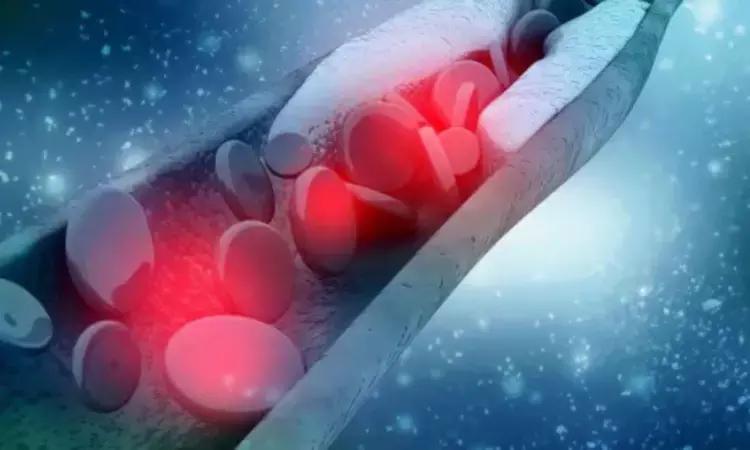
Exploring Etidronate Treatment For Arterial Calcification: A Pilot Study On ACDC
- byDoctor News Daily Team
- 18 February, 2025
- 0 Comments
- 0 Mins

USA: In a pilot study published in Vascular Medicine, etidronate was shown to slow the progression of vascular calcification in the lower extremities for patients with arterial calcification due to deficiency of CD73 (ACDC).
The researchers found that etidronate treatment slowed the progression of further vascular calcification in the lower extremities as measured by computed tomography (CT), but the treatment had no effect on reversing vascular and/or periarticular joint calcifications.
Arterial calcification due to CD73 deficiency is a rare genetic disease resulting in calcium deposits in arteries and small joints causing resting pain, claudication, deformities, and severe joint pain. Currently, no standard treatments exist for ACDC. Previous studies have identified etidronate as a potential targeted ACDC treatment, using in vitro and in vivo disease models with patient-derived cells.
Etidronate, a bisphosphonate with established efficacy in inhibiting bone resorption and preventing osteoporosis, has garnered interest for its potential role in mitigating pathological calcification in ACDC. By binding to hydroxyapatite crystals and interfering with their formation and growth, etidronate exhibits anti-calcification properties that could translate into therapeutic benefits for individuals with ACDC.
In the study, Elisa A Ferrante, National Heart, Lung, and Blood Institute, National Institutes of Health, Bethesda, MD, USA, and colleagues tested the effectiveness and safety of etidronate in attenuating the progression of lower-extremity arterial calcification and vascular blood flow based on the ankle-brachial index (ABI) and computed tomography (CT) calcium score.
For this purpose, the researchers conducted an open-label, nonrandomized, single-arm pilot study for etidronate treatment enrolling adult patients with a confirmed genetic diagnosis of ACDC. They took daily etidronate for 14 days every 3 months and were examined at the NIH Clinical Center bi-annually for 3 years.
They received a baseline evaluation and yearly follow-up after treatment. Study visits included exercise tolerance tests with ABIs, imaging studies, clinical blood and urine testing, and full dental exams.
The study found that etidronate treatment appeared to have slowed the progression of further vascular calcification in lower extremities as measured by CT but has no impact in reversing vascular and/or periarticular joint calcifications in the small ACDC cohort.
"Despite the small sample size, these findings potentially suggest that etidronate could be considered for patients with progressive vascular calcification due to ACDC, particularly given the total lack of any other treatment options for this disease," the authors wrote.
"In addition, the knowledge gained for the pathology, natural history, and clinical presentation of ACDC has been invaluable and will inform the development of novel therapies and larger clinical trials for this and other calcifying vascular diseases."
Reference:
Ferrante, E. A., Cudrici, C. D., Rashidi, M., Fu, P., Huffstutler, R., Carney, K., Chen, M. Y., St Hilaire, C., Smith, K., Bagheri, H., Katz, J. D., Ferreira, C. R., Gahl, W. A., Boehm, M., & Brofferio, A. (2024). A pilot study to evaluate the safety and effectiveness of etidronate treatment for arterial calcification due to deficiency of CD73 (ACDC). Vascular Medicine. https://doi.org/10.1177/1358863X241235669
Disclaimer: This website is designed for healthcare professionals and serves solely for informational purposes.
The content provided should not be interpreted as medical advice, diagnosis, treatment recommendations, prescriptions, or endorsements of specific medical practices. It is not a replacement for professional medical consultation or the expertise of a licensed healthcare provider.
Given the ever-evolving nature of medical science, we strive to keep our information accurate and up to date. However, we do not guarantee the completeness or accuracy of the content.
If you come across any inconsistencies, please reach out to us at
admin@doctornewsdaily.com.
We do not support or endorse medical opinions, treatments, or recommendations that contradict the advice of qualified healthcare professionals.
By using this website, you agree to our
Terms of Use,
Privacy Policy, and
Advertisement Policy.
For further details, please review our
Full Disclaimer.

Recent News
Normal-Tension Glaucoma Closely Associated With Co...
- 10 October, 2022
Air Pollution Tied To Increased Risk Of Premature...
- 24 May, 2023
NEET PG 2024: NBE Opens Pre-Final Edit Window
- 30 May, 2024
NMC Mulls Over Removal Of Upper Age Cap In MBBS En...
- 30 November, 2021

Daily Newsletter
Get all the top stories from Blogs to keep track.


0 Comments
Post a comment
No comments yet. Be the first to comment!